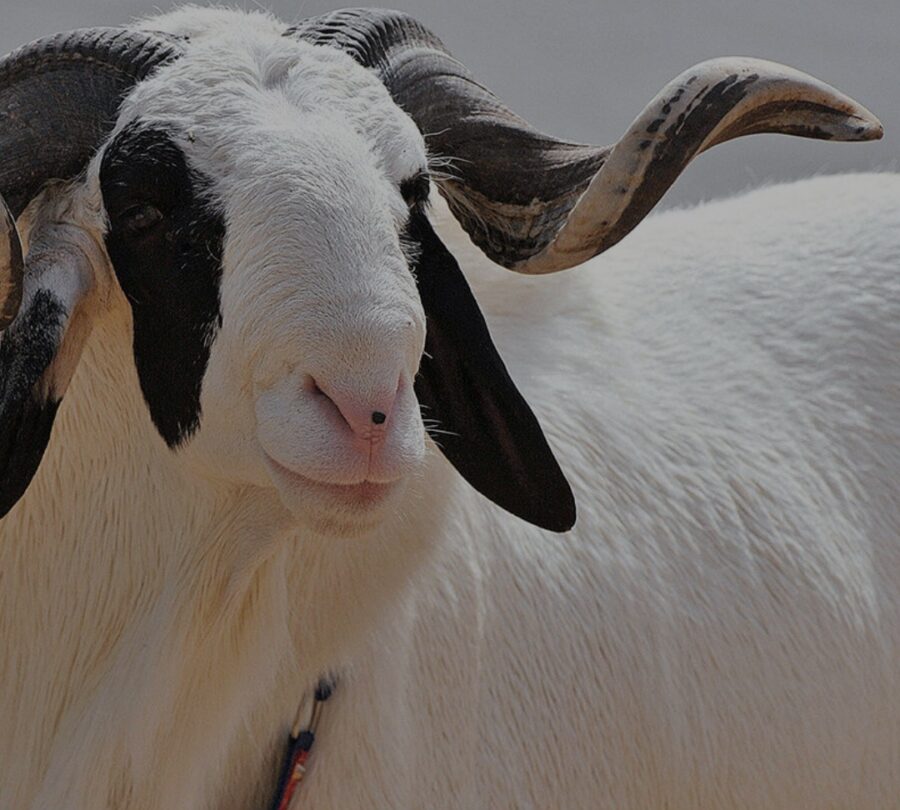Several Muslim communities perform the `Eid Al-Adha sacrifice at homes or outdoor just outside homes. But increasingly, qurban takes place in abattoirs, out of sight of the general public.

How Much Halal is Your `Eid Qurban?
Or as is the prevailing custom among the Muslim living in the West; we send money for sacrifice to home countries or donate to charities who perform this righteous deed on our behalf.
Islam asks us to perform a well-mannered and well-organized sacrifice, but not just a ritual slaughter of empty traditions.
Unfortunately, some Muslims don’t stick to the deep holistic approach of the Islamic Shari’ah concerning sacrifice. Sometimes the animals aren’t sacrificed in the correct manner or even aren’t suitable for sacrifice in the first place.
To perform sacrifice like Sunnah, the animal must be healthy, born without major defects, possessing most of its teeth and strong enough to walk to the place of slaughter.
A goat should be no less than 1 year old; a sheep no less than 6 months on condition that it is fat; a cow no less than 2 years; and a camel 5 years.
Shari’ah recommends that any Muslim performs sacrifice by himself if he is able to slaughter properly, otherwise he may pay for someone else to do it for him, but his presence at the zabihah is desirable, but not obligatory.
In Islam, an inexperienced person can’t slaughter the udhiyah since this might torture the animal and cause both physiological and psychological suffering for it.
Shaykh Zakariyya ibn Yusuf explained that “The Islamic slaughter requires that the throat, the external jugular veins and the wind-pipe of the animal is swiftly and clearly severed with a sharp tool, together with invoking the name of Allah Most High. If only two of the passages and veins are cut, the slaughter will be deemed incorrect. If any three of the four are severed, the slaughter will be valid.”
Follow Shari’ah & Sunnah
Shari’ah recommends that the animal should face Qiblah at the time of slaughter and it is disliked to sacrifice animals in the presence of other animals or to sharpen the knife in their view.
Shari’ah forbids maltreating the qurban, and the Prophet (PBUH) taught us to treat animals with kindness.
Shadid b. Aus reported that Prophet Muhammad said: “Verily Allah has enjoined goodness to everything; so when you kill, kill in a good way and when you slaughter, slaughter in a good way. So every one of you should sharpen his knife, and let the slaughtered animal die comfortably.”(Muslim 21:4810).
The Righteous Imams also reminded Muslims about the importance of animal welfare. Hazrat Ali (RA) said: “Don’t slaughter sheep in the presence of other sheep, or any animal in the presence of other animals.”
And Hazrat ‘Omar upon seeing a man denying a sheep, which he was going to slaughter, a satiating measure of water to drink, gave the man a beating with his lash and told him: “Go, water it properly at the time of its death, you knave!” (Reported by Ibn Sirin about Hazrat ‘Omar and recorded in Badae al-Sande; 6:2811).
Stressed Qurban=Harmful Meat
Dr. Abdul Majid Katme, a spokesman on medical ethics, the advocate for halal and tayyib slaughter and animal welfare in Islam told AboutIslam.net that much of the halal-labeled meat available in the UK isn’t actually halal.
People who don’t follow the Islamic Shari’ah sacrifice the qurban in mass slaughter. They stress the qurban which causes toxic effects on meat. This certainly can’t be pure.
Allah says in the Quran regarding the sacrifice of the animals: ‘It is neither their flesh nor their blood that reaches Allah; it is your piety that reaches Him.’ (Surat Al-Hajj 22:37).
Keeping this in mind shouldn’t we all reconsider our approach to `Eid qurban? If we do it with the sincere intention of pleasing Allah, then we shall take no shortcuts and seek no excuses, but rather try to do it in the best manner, as taught by the Prophet (PBUH).
SOURCE: https://aboutislam.net/muslim-issues/science-muslim-issues/how-much-halal-is-your-eid-qurban/

